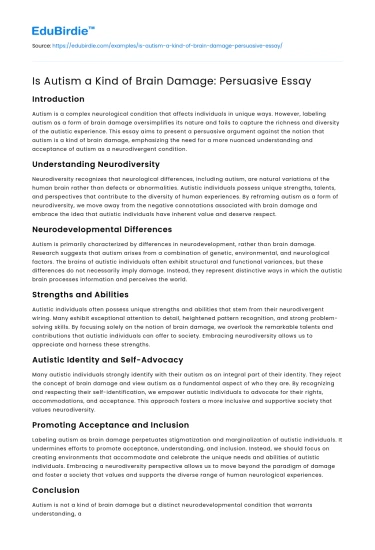Introduction
Autism is a complex neurological condition that affects individuals in unique ways. However, labeling autism as a form of brain damage oversimplifies its nature and fails to capture the richness and diversity of the autistic experience. This essay aims to present a persuasive argument against the notion that autism is a kind of brain damage, emphasizing the need for a more nuanced understanding and acceptance of autism as a neurodivergent condition.
Understanding Neurodiversity
Neurodiversity recognizes that neurological differences, including autism, are natural variations of the human brain rather than defects or abnormalities. Autistic individuals possess unique strengths, talents, and perspectives that contribute to the diversity of human experiences. By reframing autism as a form of neurodiversity, we move away from the negative connotations associated with brain damage and embrace the idea that autistic individuals have inherent value and deserve respect.
Save your time!
We can take care of your essay
- Proper editing and formatting
- Free revision, title page, and bibliography
- Flexible prices and money-back guarantee
Neurodevelopmental Differences
Autism is primarily characterized by differences in neurodevelopment, rather than brain damage. Research suggests that autism arises from a combination of genetic, environmental, and neurological factors. The brains of autistic individuals often exhibit structural and functional variances, but these differences do not necessarily imply damage. Instead, they represent distinctive ways in which the autistic brain processes information and perceives the world.
Strengths and Abilities
Autistic individuals often possess unique strengths and abilities that stem from their neurodivergent wiring. Many exhibit exceptional attention to detail, heightened pattern recognition, and strong problem-solving skills. By focusing solely on the notion of brain damage, we overlook the remarkable talents and contributions that autistic individuals can offer to society. Embracing neurodiversity allows us to appreciate and harness these strengths.
Autistic Identity and Self-Advocacy
Many autistic individuals strongly identify with their autism as an integral part of their identity. They reject the concept of brain damage and view autism as a fundamental aspect of who they are. By recognizing and respecting their self-identification, we empower autistic individuals to advocate for their rights, accommodations, and acceptance. This approach fosters a more inclusive and supportive society that values neurodiversity.
Promoting Acceptance and Inclusion
Labeling autism as brain damage perpetuates stigmatization and marginalization of autistic individuals. It undermines efforts to promote acceptance, understanding, and inclusion. Instead, we should focus on creating environments that accommodate and celebrate the unique needs and abilities of autistic individuals. Embracing a neurodiversity perspective allows us to move beyond the paradigm of damage and foster a society that values and supports the diverse range of human neurological experiences.
Conclusion
Autism is not a kind of brain damage but a distinct neurodevelopmental condition that warrants understanding, acceptance, and support. Recognizing autism as a form of neurodiversity reframes the conversation, highlighting the strengths and unique perspectives of autistic individuals. By challenging the notion of brain damage and embracing the principles of neurodiversity, we can build a more inclusive society that values the contributions of all individuals, regardless of their neurological differences. It is through acceptance and support that we can foster a world that celebrates the richness and diversity of human minds.






 Stuck on your essay?
Stuck on your essay?

